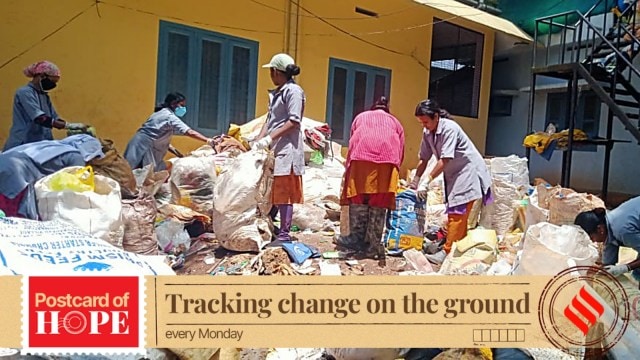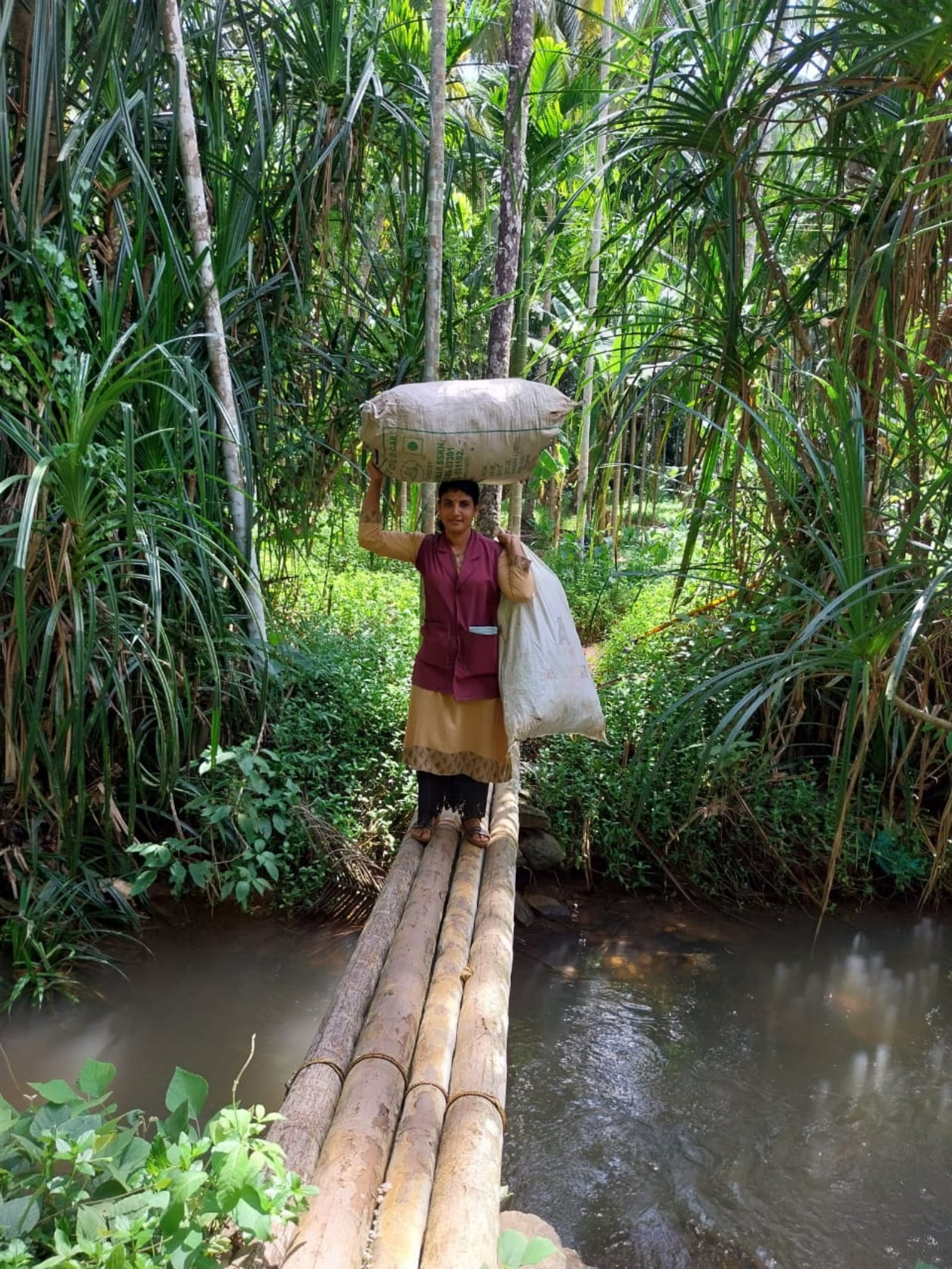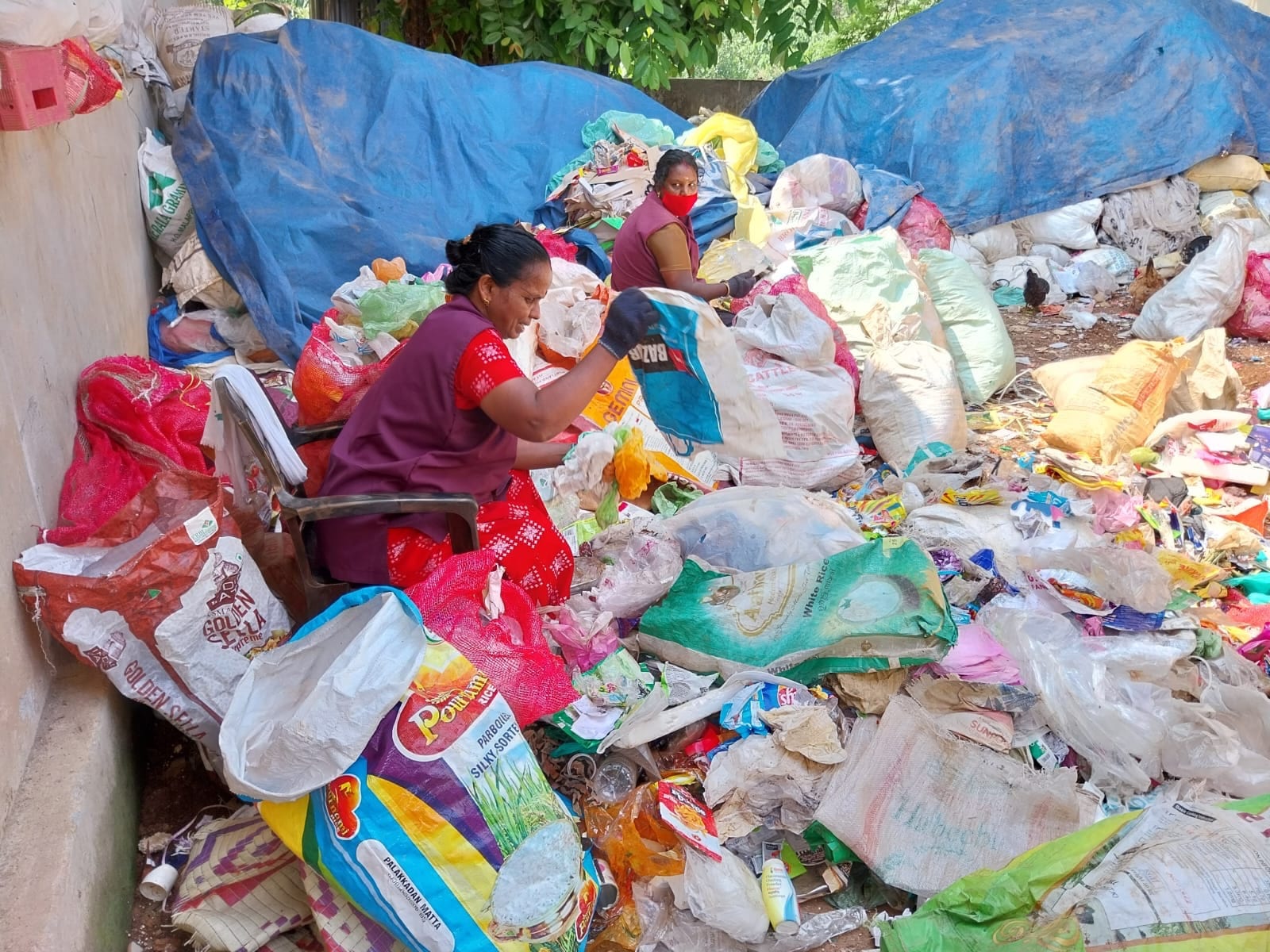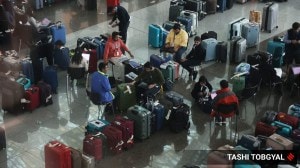Rags to riches: In Kerala, picking waste is helping women earn thousands
As the state's cleaning army, called the Haritha Karma Sena, crosses 34,000 members, a look at who it benefits
 In many local bodies, these women are being encouraged to take driving licences so they can drive waste-laden vehicles, bought by local bodies, for collection and despatch of waste. (Express Photo)
In many local bodies, these women are being encouraged to take driving licences so they can drive waste-laden vehicles, bought by local bodies, for collection and despatch of waste. (Express Photo) K Divya (38) never dreamed that waste from her own village would change her fortunes. By picking up rags, mainly plastic waste from households at her village and selling the trash for recycling, the Malappuram resident now earns up to Rs 30,000 a month. She is one of a dozen Haritha Karma Sena (HKS) members at Kerala’s Keezhattur village, who have started earning between Rs 30,000 to Rs 50,000 a month.
Revathi (30) had been a school teacher, albeit a temporary one, for many years, earning a meagre Rs 5,000 per month. As a regular job remained a distant dream, a year ago she joined as a member of HKS, covering two wards at Nenmanikkara panchayat in Thrissur. The mother of two now earns roughly Rs 20,000 a month.
Divya and Revathi are members of Kerala’s cleaning army whose number crossed 34,000 last month as the initiative emerges as a key women empowerment programme in the state. Working under local civic governing bodies, the women in uniform go door to door, collecting non-biodegradable waste.
 A member of the Haritha Karma Sena returns from a house after collecting waste. (Express Photo)
A member of the Haritha Karma Sena returns from a house after collecting waste. (Express Photo)
The Union Government, as per the Solid Waste Management Rules, 2015, had stipulated that LSGDs or Local Self Government Departments provide waste management services under their jurisdiction, and collect user fees from individual households and institutions for such services. In Kerala, the fee has been fixed for Rs 50 for individual households, and Rs 100 for shops and businesses.
“This is a unique model of waste management. We have launched this as a subsidiary venture of Kudumbashree Mission, the state’s flagship poverty alleviation mission. Now, waste management has been identified as a major area of their intervention,” Kerala Local Self Government Minister M B Rajesh said.
On how the fee of HKS members can be raised further, Rajesh said: “At present, we have 61 per cent coverage, which has to be increased to 100 percent in the near future. A major issue is people’s reluctance to pay the user fee. To address this, we have directed local bodies to collect their dues with penalty along with property tax, levied annually. The scheme is a micro-enterprise, fully owned and operated by women under the support of local self-government bodies. These women are not ragpickers, but entrepreneurs in waste management.”
“Many households are still reluctant to abandon the habit of littering. We are on an intensive enlightenment drive to bring in a behavioural change,” he said.
A brighter future
A steady regular income has helped the women improve their living standards, and imagine a better future for their children. In many local bodies, these women are being encouraged to take driving licences so they can drive waste-laden vehicles, bought by local bodies, for collection and despatch of waste.
Keezhattur panchayat secretary S Rajesh Kumar said their panchayat has achieved 90 percent coverage in user fee collection. “There is a competition among HKS members to collect more waste and segregate it for recycling. The more you collect and segregate, the more your income.”
Thoppil Vijaya (54), an HKS member at Keezhattur, said her dream of owning a house was realised thanks to the initiative. “Initially, I got only Rs 3,000; now it has grown to Rs 28,000 a month. Some of us have started constructing a new house or improving the existing ones. We were all struggling to make both ends meet. Now we are all happy,” she said.
 Members of the Haritha Karma Sena segregate waste at a material collection facility. (Express Photo)
Members of the Haritha Karma Sena segregate waste at a material collection facility. (Express Photo)
Divya, another HKS member at Keezhattur, said, “None of us had any regular source of income. A few were working as domestic helps. While selling waste for recycling units, we do it as a business, not as ragpickers. We meet a lot of people every month and interact with officials, which has changed our social life too.”
Aparnaka K (28) from Nenmanikkara said that when she started as a HKS in 2021, the monthly income was only 750. “We struggled a lot and even thought of quitting. But slowly people started cooperating, and the income went up. Last month, I made Rs 20,000. Now we feel that we are financially self-sufficient. I can support my husband, who does upholstery work,” said Aparna.
Nenmanikkara panchayat president T S Baiju said the resistance from people to pay the user fee has come down. “We presented the issue at a public avenue and launched a campaign. We have ensured at least Rs 20,000 as wages for all HKS members in the panchayat. We have also honoured them so that public perception towards them as waste collectors changes. Payment of user fee has been made mandatory for availing any service from the panchayat office,” he said.
How the sena works
As per official data, the state has 34,851 HKS members in 1,034 local bodies. The highest monthly income earned by an HKS member goes up to Rs 50,000. However, in areas or local bodies where its members work only for 10 to 15 days, the income can fall to as low as 4,000.
Official sources said the income depends on collection of user fees and sales from recycling. If the fee collection is 100 percent in ward of 750 households, normally two persons doing the door-to-door collection would get Rs 37,500 as user fee in a month. Besides, they would get the amount from selling various stuff, segregated for recycling.
The HKS functions as a network of micro-enterprises, owned and managed by women. At the local body level, the sena members form a consortium to function. Though it was announced in 2016, the sena gathered momentum after the pandemic years when local bodies focused on system building under the state’s Suchitwa (clean) Keralam Campaign.
HKS has a calendar for their operations. In the first three weeks of a month, its members, in small groups, go from house to house, collecting user fees. Using smartphones, the members scan a QR code displayed at the houses, enabling local civic body officials to monitor coverage and collection of waste.
As per the plan, all wards/divisions of local bodies should have mini material collection centres, which are small sheds with racks to temporarily store the collected waste. This waste is shifted to panchayat level material collection facilities, where the members again segregate the waste before dispatching it for recycling.
Panchayats have a calendar for collection of different types of non-biodegradable waste such as plastic, bottles, sandals, glass, etc. Households are informed in advance through WhatsApp on which type of waste should be made ready to be lifted every month. This calendar ensures the vital segregation of waste at the source and eases the job of sena members.
Apart from user fee, another source of income for HKS members is the amount from selling the plastic waste, plastic bottles, glassware, scrap materials and other items for recycling to various private agencies. The user fee and the amount collected from selling for recycling are credited into the account of the panchayat level consortium, which is disbursed to the members every month. The consortium allows the members to deposit 10 percent of their income to form a corpus fund, which they can use for any financial emergencies.







